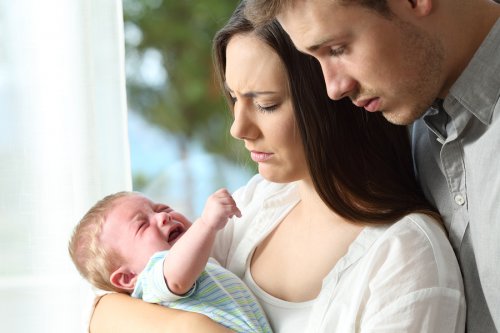My Baby Won't Stop Crying!

Many parents desperately wonder why their baby won’t stop crying and they don’t know what to do. In this article we’ll help you solve this situation.
Crying is how babies express themselves. However, when they’re constantly crying, it goes beyond the limits of our patience.
My baby won’t stop crying: is it normal?
A baby’s cry can be gut-wrenching and become our worst nightmare. It keeps us from enjoying parenthood. You’ve probably heard some parents say: “I can’t sleep because my baby cries so much,” and see them tired and in a bad mood.
Apart from that, you might see that they’ve given up entirely because “babies are supposed to cry, it’s what’s normal.”
Although the little ones use their crying to communicate what they feel or need, it’s also true that they shouldn’t spend their days crying.
When is it understandable and when is it excessive? Not all babies are the same; you probably already knew that. Also, you must keep in mind that newborns tend to cry more. It’s all new to them and they don’t understand their bodies and emotions yet.

Reasons why your baby won’t stop crying
To solve this issue, the first step is to determine the reason why they’re crying so much. One of the most common reasons is colic, which is present during the first months.
Colic includes a series of symptoms such as stomachache, gas, vomit, diarrhea or constipation. It can be very unpleasant for the baby.
Babies may also be crying because they’re very hungry. Maybe breast milk isn’t enough to satiate them completely and therefore require baby formula. Ask your pediatrician for advice on this matter.
Another reason your baby might be crying is that she may be sensitive to high temperatures, or her clothes may be too tight. Maybe she can’t stand when her diaper is wet or maybe she’s just very sleepy and can’t get a good sleep.
Did you know that some babies can get nervous more easily in the environments that don’t provide them the calm they need? This tends to be a very common reason for the intense crying.
In that case, you might want to resort to musical techniques or get the baby out for a ride in the stroller or in the car. A change of environment will help reduce stress and anxiety.
“Not all babies are the same; plus, you must keep in mind that newborns tend to cry more.”
My baby won’t stop crying and I can’t get them to calm down!
This is a common issue, especially for first-time parents. Usually, they don’t know how to stop their baby’s crying. And of course this makes them anxious.
What they may not know is that the anxiety passes down to the baby; and maybe that’s why all the techniques they try, don’t work.
So, the first step is for mom and dad to calm down. Use a meditation or breathing exercise, go out alone for a while, drink some tea or take a nap.

Once you feel calm again, you can take the baby in your arms and hold her against your chest, so that the baby can feel the beating of her mom’s or dad’s heart.
Some people recommend taking your shirt off, in order to get the most out of a skin-to-skin contact. Moreover, lullabies, songs and caressing may help a lot.
Another option is “The Hold” technique, invented by an American doctor. It’s about “sitting” the baby down in one of your hands. Then, with your free hand, hug the baby.
Hold the baby to your chest with one hand and incline her to 45°, very carefully. Try to make sure the baby’s head doesn’t lean forward too much.
Finally, rock the baby back and forth and smoothly move her hips in circles. You’ll see your little one calm down right away!
If you’ve ever said “my baby won’t stop crying,” we recommend this technique once you’ve ruled out all the possible health-issues and causes of discomfort.
Your pediatrician will help you if you’re a first-timer and don’t know how to calm down your baby. Don’t hesitate to ask!
Many parents desperately wonder why their baby won’t stop crying and they don’t know what to do. In this article we’ll help you solve this situation.
Crying is how babies express themselves. However, when they’re constantly crying, it goes beyond the limits of our patience.
My baby won’t stop crying: is it normal?
A baby’s cry can be gut-wrenching and become our worst nightmare. It keeps us from enjoying parenthood. You’ve probably heard some parents say: “I can’t sleep because my baby cries so much,” and see them tired and in a bad mood.
Apart from that, you might see that they’ve given up entirely because “babies are supposed to cry, it’s what’s normal.”
Although the little ones use their crying to communicate what they feel or need, it’s also true that they shouldn’t spend their days crying.
When is it understandable and when is it excessive? Not all babies are the same; you probably already knew that. Also, you must keep in mind that newborns tend to cry more. It’s all new to them and they don’t understand their bodies and emotions yet.

Reasons why your baby won’t stop crying
To solve this issue, the first step is to determine the reason why they’re crying so much. One of the most common reasons is colic, which is present during the first months.
Colic includes a series of symptoms such as stomachache, gas, vomit, diarrhea or constipation. It can be very unpleasant for the baby.
Babies may also be crying because they’re very hungry. Maybe breast milk isn’t enough to satiate them completely and therefore require baby formula. Ask your pediatrician for advice on this matter.
Another reason your baby might be crying is that she may be sensitive to high temperatures, or her clothes may be too tight. Maybe she can’t stand when her diaper is wet or maybe she’s just very sleepy and can’t get a good sleep.
Did you know that some babies can get nervous more easily in the environments that don’t provide them the calm they need? This tends to be a very common reason for the intense crying.
In that case, you might want to resort to musical techniques or get the baby out for a ride in the stroller or in the car. A change of environment will help reduce stress and anxiety.
“Not all babies are the same; plus, you must keep in mind that newborns tend to cry more.”
My baby won’t stop crying and I can’t get them to calm down!
This is a common issue, especially for first-time parents. Usually, they don’t know how to stop their baby’s crying. And of course this makes them anxious.
What they may not know is that the anxiety passes down to the baby; and maybe that’s why all the techniques they try, don’t work.
So, the first step is for mom and dad to calm down. Use a meditation or breathing exercise, go out alone for a while, drink some tea or take a nap.

Once you feel calm again, you can take the baby in your arms and hold her against your chest, so that the baby can feel the beating of her mom’s or dad’s heart.
Some people recommend taking your shirt off, in order to get the most out of a skin-to-skin contact. Moreover, lullabies, songs and caressing may help a lot.
Another option is “The Hold” technique, invented by an American doctor. It’s about “sitting” the baby down in one of your hands. Then, with your free hand, hug the baby.
Hold the baby to your chest with one hand and incline her to 45°, very carefully. Try to make sure the baby’s head doesn’t lean forward too much.
Finally, rock the baby back and forth and smoothly move her hips in circles. You’ll see your little one calm down right away!
If you’ve ever said “my baby won’t stop crying,” we recommend this technique once you’ve ruled out all the possible health-issues and causes of discomfort.
Your pediatrician will help you if you’re a first-timer and don’t know how to calm down your baby. Don’t hesitate to ask!
All cited sources were thoroughly reviewed by our team to ensure their quality, reliability, currency, and validity. The bibliography of this article was considered reliable and of academic or scientific accuracy.
- de Cock, E. S., Henrichs, J., Rijk, C. H., & van Bakel, H. J. (2015). Baby please stop crying: An experimental approach to infant crying, affect, and expected parenting self-efficacy. Journal of Reproductive and Infant Psychology, 33(4), 414-425. https://www.tandfonline.com/doi/abs/10.1080/02646838.2015.1024212
- Long, T., & Johnson, M. (2001). Living and coping with excessive infantile crying. Journal of advanced nursing, 34(2), 155-162. https://onlinelibrary.wiley.com/doi/abs/10.1046/j.1365-2648.2001.01740.x
- Jones, S. (1992). Crying baby, sleepless nights. Houghton Mifflin Harcourt.
- Illingworth, R. S. (1955). Crying in infants and children. British medical journal, 1(4905), 75. https://www.ncbi.nlm.nih.gov/pmc/articles/PMC2060770/
- Hiscock, H., & Jordan, B. (2004). 1. Problem crying in infancy. Medical journal of Australia, 181(9), 507-512. https://onlinelibrary.wiley.com/doi/abs/10.5694/j.1326-5377.2004.tb06414.x
This text is provided for informational purposes only and does not replace consultation with a professional. If in doubt, consult your specialist.








